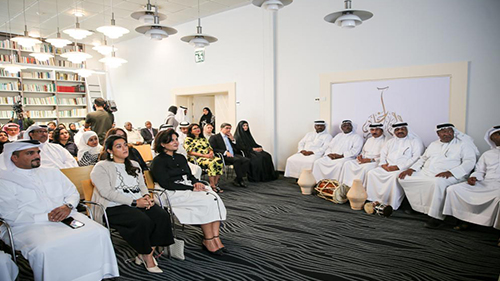23 September 2019
Curtain Fell On The First National Intangible Cultural Heritage Forum, Bahrain Culture Authority highlights national inventory lists


Curtain has fallen on the First Intangible Cultural Heritage Forum on 23 September 2019, which was organized by Bahrain’s Authority for Culture & Antiquities, as part of its strategy to raise awareness among heritage researchers and enthusiasts about the UNESCO 2003 Convention for the Safeguarding of the Intangible Cultural Heritage, ratified and adopted by the Kingdom of Bahrain. The aim behind this move is to form an international effective mechanism to safeguard and promote cultural heritage as part of BACA’s efforts to align with its international UNESCO obligations and requirements.
The Forum’s final statement recommendations reflected the Kingdom of Bahrain has satisfied UNESCO Convention requirements, highlighting the importance of cooperation with all specialists and researchers in heritage with regard to the forum’s initiatives. The participants also stressed the importance of the inclusion of promising and talented young people in research and documentation, and the rehabilitation of students by BACA with regard to the agreed conventional documentation of the oral heritage.
The recommendations also included a stereotype special emphasis on the University of Bahrain’s exemplary experience and expertise in this regard, namely storytelling and folk tales registered by Dr. Dhia Al Kaabi, and also the Culture Authority recorded oral tales, considered to be a reference and source for researchers. BACA has also called on all interested researchers to present their proposals regarding the definition and the introduction of the core elements of the national heritage through publications, providing that these manuals or publications are released in other languages than Arabic, no matter its form or primary drafts as long as they satisfy accepted rigorous scientific standards in this regard.
In addition, the Forum’s final statement recommendations also highlighted the importance of continuing the national inventory lists, adding more elements every year to be safeguarded and preserved by specialists.
The forum also noted that inscribing intangible cultural heritage elements on UNESCO inventory list is an important step, along with other mechanisms, towards safeguarding the convention, confirming that BACA is working on the implementation of a national inventory list of cultural heritage elements in line with the Convention, revised and prepared by experts and academicians. The forum also highlighted the elements of Bahraini intangible cultural heritage, that can be nominated for the Representative List and their identification, which is a process of describing one or more specific elements of intangible cultural heritage in their own context and distinguishing them from others by experts and specialists.
Intangible Cultural Heritage Elements: Speakers
Dr. Dalel Al Sherooqi: Richness of the Bahraini cuisine and the need to document older generation experiences.
The first session, which was dedicated to the popular traditional food as a national heritage element, Bahraini cooking expert Dr. Dalal Al Sheroogi, presented an amazing lecture on societies’ interactions with food, especially in modern times, given the diversity of worldwide cuisines and the easiness of accessibility.
Dr. Dalal has demonstrated very much acknowledged Bahrain's authentic culinary heritage is rich given the visitors and foreign influence on the island during decades, introducing food into popular proverbs and songs. Al-Sherooqi also shed light on the impact of social occasions, such as vows, birthdays, marriage ceremonies on the Bahraini cuisine, noting the temporary recipes that spread during the II world war and how they quickly disappeared. Diplomatic missions to Bahrain have also contributed to the richness of Bahraini cuisine, bringing new recipes and delicious dishes into our tables, Al-Sherooqi added.
During this session, a video was screened showing Bahraini chef and artist, Mohammad Sulaiman explaining how stories and cooking techniques have accompanied marriage ceremonies and the participation of the families involved in this social happy event.
Bin Harban calls on youth to safeguard performing arts for fear of loss and extinction
The second lecture by Mr. Jassim Mohammed Al-Harban, Director of Student Services, Ministry of Education, Kingdom of Bahrain shed lights on famous traditional folk music performances, namely the Fijjri art, the unique, mystical genre traces its roots back to the days of the island’s glorious pearling legacy. The lecture gave a detailed definition of “ Dar” in its pure linguistic terms, and its cultural context, its physical components made of a rectangular singing performing room, a store room, before Al-Harban moved to speak about hierarchical organization of “Al-Dar”, its president election procedure, its other members and prerogatives and privileges of the positions.
Al-Harban explained how “ Al-Dar” hosts happy ceremonial events for its members without any charges, helps finance the construction and restoration of their homes, an old practice that is still exist nowadays. Al-Harban voiced his concern and sadness with regard to the decreasing number of Dars in Muharraq, from 32 to 4 Dars currently, calling for providing more support to the young generations to continue the legacy of performing arts for fear of disappearance and extinction.
Jamal Shaeen Calls for students’ Dhow boat making training
The third forum session, presented by Mr. Jamal Shaeen, shed lights on the old dhow making traditions, which are threatened by oblivion and extinction. Indeed, a visit to Bahrain is never complete if one misses out the Dhow Building yard, hidden behind the high fence by the Khalifa Al Kabeer Highway next to the Fishermen’s Port in Muharraq, which is the oldest and the only Dhow building yard of the Kingdom of Bahrain. The high raised masts of the completed dhows welcome the visitors to the busy yard where the timbers lying around and the melody of the gentle sea breeze tells you a different story about a seafaring pearling nation.
Shaheen also stressed the urgency to teach and train school students the dhow-making techniques to guarantee its continuity and prevent its extinction, especially with the disappearance of this dhow-making locations and venues, in Manama, Al-Naim, Muharraq and Sitra.







